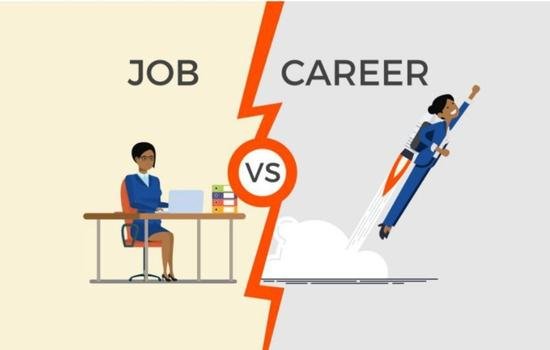These days, “career vs. job” is a popular topic of conversation. Some people believe that you should only pursue a career if you are passionate about it, while others think you must go the conventional route. The truth is, there’s no one right way to do life! Everyone has a different path that leads to the same destination, and that’s happiness. I think that we all have different passions and we’re all unique, but I also think that passion can be something you’re born with or something you acquire over time. Whether or not you’re following your passion may be up to you, but either way, you can find joy and fulfillment in your life if you just focus on what’s most important to you how do you know if you’re truly passionate about something?
Create a Plan to Achieve Your Career and Job
Write down a list of all the things you are passionate about – whether it’s sports, art, family, or something else entirely. List at least 5 things and keep them somewhere you can see them every day. When you find yourself thinking of these things throughout the day, remember that passion is a skill that can be learned. Being passionate is like swimming or riding a bike; once you learn it, you can do it for the rest of your life. So if you really want to follow your passion start practicing today. Start by writing down all the things you care about most in life and then create a plan for reaching those goals.

Evaluate Your Skills and Interests
The first step to choosing a career is to identify your skills and interests and identify what type of career is a good fit for you. To do this, you can complete an interest inventory questionnaire or an occupational interest survey that will help you identify the careers that you might like to pursue. You can also take an online personality test to learn more about your strengths and weaknesses and identify the types of jobs that you would well suited to do. It’s important to take your time when completing these assessments because you’ll be relying on them to help you identify the right career for you. Keep in mind that there are no right or wrong answers when it comes to assessing your skills and interests, and the assessment process is mean to be informative and not stressful.
Research Career Options
Once you’ve identified the skills you want to develop and the occupations you’d like to explore. You can start doing research about the different career paths you’re interested in. You can take classes at a community college or university or look for opportunities in your community. That will allow you to gain hands-on experience in your field of interest.
Also Read:-Spending just a few months in Antarctica can shrink your brain
Determine Your Job Objective
It is time to make a decision and establish some goals once you have explored your alternatives through career research and field research. Your Job Target refers to the components of this decision. Your Job Target is the industry and job you want to work in. Geographic location may also be included. As you gain experience and understanding about yourself, your job target may vary.
Increase Your Credentials and Resume
This stage is ongoing, and the more certifications you acquire, the better your CV will become. A strong résumé results in interviews and job offers.
Job vs. Career: Which is Right for You?
As you prepare to make your career choice, it’s important to know the difference between a career and a job. A career is a long-term path you choose to follow, while a job is what you do for pay. These definitions can apply to many different professions including teachers, scientists, and engineers. Consider the following scenarios to better understand these definitions of career and job.

Scenario 1: You are a student majoring in biology and would like to pursue a career as an environmental scientist. In this case, you are choosing a career path based on your interests. This type of career choice is also called an “early-stage career.” It’s important to start considering your career options while you are still in school. So you can begin preparing for your future career while still earning college credits.
Scenario 2: You have been working as a secretary at a local company for a few years. And you would like to transition to a role that better utilizes your skills. In this scenario, you are choosing a job based on your skills and experience rather than your desired career path. Your current career job as a secretary is the job you are currently doing for pay. While this job is rewarding, it may not be the best job for you long term. Consider looking for a new position that has better opportunities for growth and greater responsibilities.
Pros & Cons of Career
A career typically involves a long-term, salaried position. That is based on your qualifications and/or experience rather than on the number of hours you work each week. It enables you to make a serious long-term investment in your career and get ahead financially.
On the other hand, many careers involve a lot of stress, long work hours, and unpredictable income. Which can make it difficult to balance work and personal life. For example, you’re at the mercy of managers who may make you work overtime or take a vacation day for yourself to cover for their absences. This can leave you feeling burnt out and demotivated.
Pros & Cons of Jobs
A job is typically a temporary position that pays an hourly wage. It can be very lucrative, but it’s also often quite stressful and entails tight deadlines and fierce competition for promotions.
If you have a full-time job. It can be very hard to find time for a part-time job or other activities. Which can impact your social life and leave you tired at the end of the day. Plus, if you quit your job, it can be difficult to find another one with similar pay and benefits quickly.
Also Read:-UPSC Exam Preparation: What is UPSC, History, Time Period
Conclusion
It’s OK if you don’t know what you want to “be” when you grow up because most people don’t figure it out until they actually start working and get a real job. So the first thing you need to do is figure out what’s important to you. Whatever it is, your goals should be something that is truly meaningful to you. Once you’ve figured out what is important to you, the next step is to take action.




